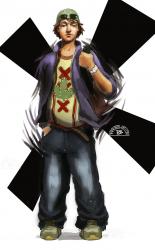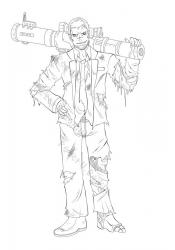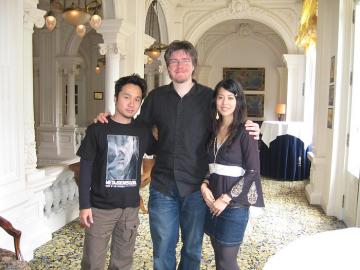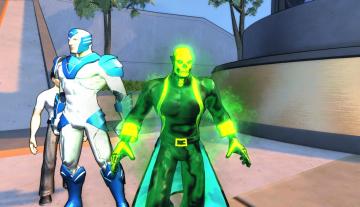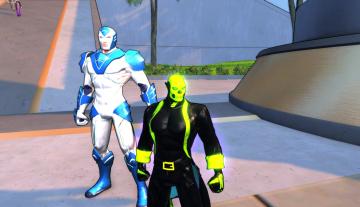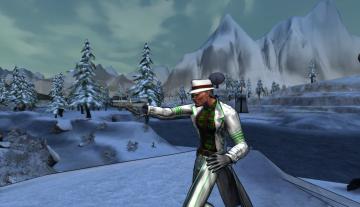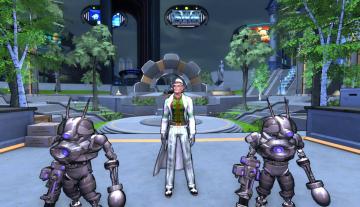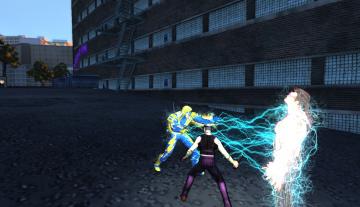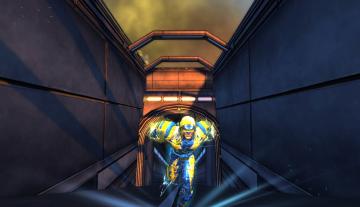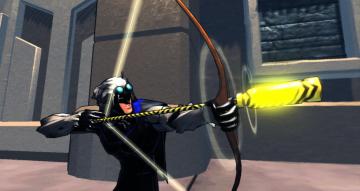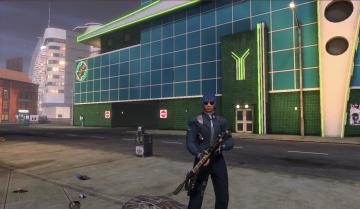
Peter
WebmasterEye For Games Interview: Al Lowe
vr 13 januari 2012 15:28:40Last year I had the opportunity, through Eye For Games, to interview Al Lowe. It took a while for the site to launch, but now that it's here I am free to post it on my own site. Be sure to check out EFG, especially if you're an aspiring designer/artist etc.
You can find the site at www.eyeforgames.com.
And now, without further ado, Al Lowe:
Well, everybody who's old knows who you are.
Al Lowe: Yeah, old people! When I was writing the games I used to joke with everybody that I was the world’s oldest game designer and that was a quarter of a century ago! So how old am I now?! [Laughs]
Could you explain to our younger readers the creature that is Al Lowe. What makes you tick?
I’ve always been a person who was comfortable entertaining, I mean, I started out as a professional musician at thirteen years old. I was professional only in the sense that I got paid to play. I wasn’t very good, but I worked my way through high school and college playing music. I was always the guy on the microphone, so I considered myself an entertainer, I would pick the music that would make people dance.
So, that was a big part of me and also comedy. Humor is a big part of my life.
I was a school music teacher for years and my students still keep in touch with me and say that I was one of the funniest teachers they ever had. I presume they mean in the form of humor as opposed to oddity. It was always a big emphasis with me. So when I got the chance to make games the first thing I did was trying to put in some humor.
I got to write Winnie the Pooh at the 100 Acre Woods for Walt Disney Software, there’s some definite jokes in there. They’re hidden in pretty well, but there is humor in there. And in every game I had involvement with since then.
When I got the chance to really create a game from scratch and run from there, Larry is what resulted.
And we’re very happy with that.
What does an average day look like, for you?
An average day? Well, what do you on Saturday? Well, that’s what I do every day.
Retirement is highly underrated, because once you retire every day is Saturday. You just kind of do the things that you enjoy doing, you don’t have to do anything for anybody else.
It’s interesting though, now that I said that, a lot of my days are spent doing things for other people. I do a lot of volunteer work, I run websites for organisations that I’m part of, I do typesetting for a couple of newsletters. Just a lot of volunteer things like that, but for the most part it’s something I do because I like to do it.
What is your biggest passion?
Well, I would have to say my family, my kids, my granddaughter. My family is very important to me, but once you step passed that, I would say probably comedy and humor. I’m a major film buff, I’ve seen all the films on the AFI (American Film Institute) top 100 films and I’m working my way up the Netflix 250.
I’m an avid reader, I read the New York Times cover to cover every day. That’s another great thing about retirement, you actually get to read the New York Times as opposed to those lesser papers you can get through in a few minutes. I have a lot of interests.
I always heard people say, when I was working, “Oh, I would never want to retire, it would be so boring“. The only thing I noticed is that people who were bored of retirement were boring people before they retired.
How did you become a developer/designer? What cemented your decision to pursue that road?
[Thinks] When I first got a chance to work on a computer it was 1978. It was a DEC PDP-11/70 mini-computer so I had a dumb terminal, but I realized it would make my life easier. I caught on quickly something that seems incredibly obvious now, but having lived through the time wasn’t.
Which was that computers can make you more productive and make you more efficient and because I’m inherently lazy I thought “Why would I retype things over and over, when I can just do them once?“ Why not do things more efficiently? So, I was always interested in working efficiently. Part of it was that the job that I had I wasn’t allowed a secretary.
Many of the other people in my office had secretaries so they never really typed. I had to do it on my own so to me it was imperative that I streamline it and become more efficient.
How I got into game design from that?
Basically, when I saw the Apple II, I thought that it would enable me to have my own computer because I had been using this kind of mainframe, the mini-computer, before. I think there were 32 people using that computer and it had one megabyte of memory. You can figure that math.
The Apple II had 48k(ilobytes) of memory, which was much more than I had on the big computer. I just thought it was a chance to do something and become more efficient. Then, I started playing games. My son was young but he and I played a lot of games. I developed a love for them and I thought, “You know, these games aren’t that difficult. I could do this!“.
As soon as the first graphics package came out for the Apple II, I knew I couldn’t code well enough to do Assembly language, graphics routines and such. But when someone started selling the graphics package I grabbed the first copy that was sold and within three months I produced two games and we sold them commercially. They were educational games, but that was my background since I was a teacher.
By doing those educational games I got in with Sierra, who was the biggest publisher of games at that time. I started designing more games for them and that’s how it all started.
It has been years since you created the Leisure Suit Larry games, do you miss him?
Yeah! There was a certain amount of grieving at the end of the adventure game era, because I got into games because like adventure gaming. I like puzzle solving and I liked story and character development, conversations and so forth. When that all went away in the late 90’s I missed it, I really actually grieved. I went through a period where I missed it and wanted it to come back and I was mad, you know. I went through the classic stages of grieving and finally came to accept it.
As a designer, what do you think of the latest games that were released under the Larry name?
Well, I obviously have mixed emotions, although not very mixed on Box Office Bust, it didn’t have a lot of redeeming characteristics - or so I’m told. Magna Cum Laude I actually went out to the store, paid full retail price and bought a copy of the game. Should’ve waited a week, they were quickly on sale.
I played through as much of it as I could stand - I have to admit I didn’t finish it, there were parts of it I would’ve been proud to have written, but there were a lot of parts that were just incredibly crude and not funny, just rude. You know, even the title, I thought I was missing the joke. Surely there’s some meaning, but all they had to do was change the last word to “louder“. I mean, two letters, how hard would it have been to make something funny?
The character’s name [thinks], what was his name? I kept thinking there is a joke there, but no, there’s no joke there.
I came to find out, about a year later after I played, I got an email from one of the guys who was a writer on the project. It made the whole problem a lot more sense to me, because they were hired to write some of the scenes in the game. They did that and they never saw the game for a year. All the other texts and responses in the game were written by somebody on the staff, a programmer or a producer or somebody. They just slapped some text in there and that’s why it was such a schizophrenic product.
The stuff that those guys wrote.. The idea that the monkey was addicted to cigarettes because he had been doing smoking experiments and he talked [gibberish], that was funny as hell. But the responses of women and a lot of the interacting parts of it were just horrible.
And then the minigames. I know what they were trying to do, I know they were trying to do something different that wasn’t an adventure game. Because an adventure game was the kiss of death, you can’t use that. But oh my God, those mini-games were so boring. So yeah, I definitely have mixed emotions.
So you’re officially retired right?
Thirteen years I’ve been retired.
But there was this game
There was? Well, I don’t know anything about that. [laughs]
It was a wonderful project a producer gave to me and said that he would get money to create a game and give me complete freedom to create whatever I wanted. It was like “Really? Let’s do it!“ We worked on it for a couple of years and got it to a wonderful stage of highly refined prototype or several levels almost finished. Maybe fifty to twenty percent complete, when we ran out of money.
It broke my heart, it was a terrible shame. I didn’t retain rights to the intellectual property, it’s now owned by somebody else. There have been press releases that it’s been picked up by another developer, but that was a long time ago and I haven’t heard anything about it since then. I don’t know anything about it.
If you could get your hands on the rights for Leisure Suit Larry, would you bring him back to life? If so, in what way?
I think those games were a good product for the time. I’m not sure if they’re good product for this time. I think that we may get a chance to find out, because the intellectual property has just purchased by Replay Games. They’re planning to renew the graphics, and change the interface to be usable on touchpads and they’re going to do an iPad, Android, iOS release and I think we can receive the first game before Christmas.
Besides Larry you’ve worked on a lot of other games, most notably Torin’s Passage which was a family friendly game inspired by the classic Disney movies. In this day and age, do you think a game like that could be done again? Would you be up for it?
Oh sure! I think that cell-based animation is timeless. You’re always going to see a product that is hand drawn. The problem with that is that it’s very expensive, that was not an inexpensive game to produce, but it was a great joy to make.
I was so thrilled to be able to work with [name], who is a three-time Academy Award winning composer. None of the game reviewers gave him the credit that he deserved on that game, because the music was just wonderful. Look at this man’s list of credits. He’s done great films for fifty years and to be able to do something with him in the early 90s was amazing.
The animation was designed by a team led by James Murphy, who left Sierra after that game and went immediately to Pixar where he’s become a big force in Pixar’s success.
I was proud of that game for another reason. It also had the most helpful help-system of any of the games that we created. We worked really hard to have a lot of hints and a lot of help available.
The industry has changed tremendously, mostly due to HD graphics, online functionalities and new control schemes. How do you feel about these changes?
Just image what I could do with Kinect! [laughs]
All of it is wonderful technology, but to me.. The human race is much older than technology and the recurring theme throughout the history of mankind has been storytelling. Even when we were living in caves sitting around campfires I’m sure people were swapping tales.
I think that the place, books, stories, cartoons, all of these things can’t be wrong. So why videogames have abandoned that for the most part is beyond me. It’s one of the reasons why I got into the industry. I’m amazed why it’s not more popular and it’s not more important.
Action is great, I’ve got nothing against action, but man.. I think somebody is going to crack this nut and figure out a way to use the elements we have today and also tell a great story and that guy is gonna get rich.
You’ll put up with a certain lack of graphics. Not only graphics, but sound quality too. I was thinking of black and white films. You can watch a great film from the 40’s, it’s still a great film! It doesn’t look good, it doesn’t sound good, it doesn’t have surround sound, but oh my God.
If your readers haven’t seen Casablanca, go spend a dollar, rent the movie and see what great storytelling is about! Sure, it’s in black and white and you’re gonna look at it and say it’s stupid, but what’s there is this wonderful tale that has survived for seventy years. This is true for all technology. It’s not technology that what makes these things. Games have proved that gameplay and game mechanics are important and when somebody figures out to add storytelling and characterdevelopment .
Telltale Games has seemingly brought back the adventure games through their use of humour in games like Sam & Max and Monkey Island. Is there a chance of you working together with your former “competitors“?
Well, I would never say never, but it seems unlikely. I’m old man! I’m happily retired, but there is a joy to game development that is unequal. I haven’t made a movie, maybe that’s a lot of intensity there, but I’ve been involved in drama and theatre productions and a lot of different aspects in music. Game design and development is a great gig, so I would never say never.
We never did consider them competitors anyway, the marketplace was so different back then that we were always delighted when a new Lucas game would come out, because they would send us free copies and we get to play a new game. We were there because we wanted to play games. There weren’t that many that came out.
It’s hard to imagine for people these days, how many games are added to the App Store each week, a hundred? In the mid-eighties people were waiting for a game to come out because they had nothing to play.
Bonus Question: Which oldies (80s/90s) game would you like to see return or even work on, if it was given the chance?
Oh gosh. Well, I was a huge fan of Loom. I don’t know if any of you know Loom, but if you could get a copy somewhere,I hope you can find it, I’m sure there must be a pirate site you can get it [laughs]. But Brian Moriarty did a great job with that game and I just love the fact that it tried to be more than just a game. It was really about larger themes, plus it was heavily into music and that hit me strong too.
So yeah, I would love to see that game.
Bonus Question 2: Did you ever, in real life, use one of the pick-up lines you came up with for Larry?
[Laughs] No! No Because I wanted to succeed!
Since Eye For Games caters to people wanting to get into the industry of creating games and we try to inspire people, do you have some inspirational advice for them?
I thought I was too late when I got into the business, in 1981 I started playing games and that was the same year I wanted to get in it too. I was sad, because I hadn’t studied math at college and I thought that everybody involved in computers had to be a mathnerd and I had missed the boat.
What I found was that I had a variety of experience that a lot of the good programmers didn’t have. I had experience in dealing with people, I knew how to entertain. The thing I mentioned this morning (Al Lowe’s opening conference at the 2011 Festival of Games) about working with a small team of people in a Jazz setting is very similar to working with a small team of people in a game setting.
So I guess what I would say is that to develop as wide a life experience as possible, because the more focused and narrow you are the harder it’s going to be for you.
The greatest days I’ve ever had have been with a group of gamedesigners, about 30 or 40, it’s very informal and they get together once a year just for a weekend to share ideas. It’s a very exclusive little club, but I got there and just had wonderful days.
Because all those guys are these incredibly wide.. In areas of interest, knowledge and experience. So yeah, I guess that would be my advice. Learn a lot about life, because you don’t know what it is you’re going to have to do in the game. So the more experience you have the better you can solve those problems.
We would like to thank you for this opportunity.
Oh, sure! My pleasure.
Games



